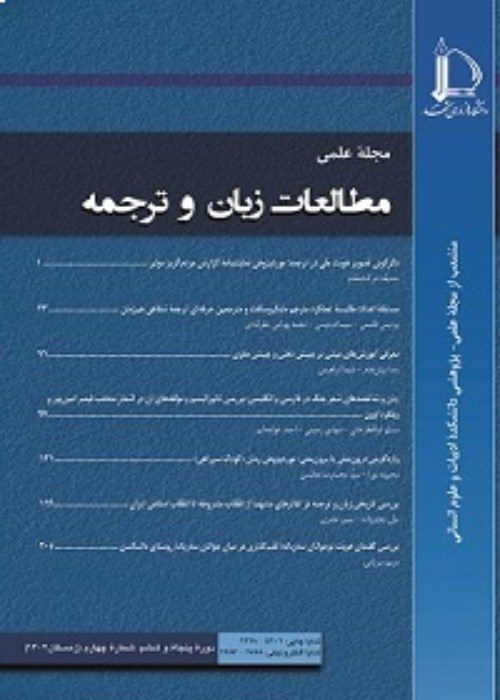Development and Validation of the Persian Scale of Teachers' Emotions for the Iranian EFL Teachers
Author(s):
Article Type:
Research/Original Article (دارای رتبه معتبر)
Abstract:
Introduction
In recent years, research on emotions has attracted the attention of many researchers (Butz, Stupnisky, & Pekrun, 2015; Frenzel, 2014). Teachers’ emotions can be as important as students’ emotions. Although many studies have focused on investigating emotions among students, very few studies have examined emotions among teachers (Chang, 2009; Frenzel, 2014). Moreover, the studies which have examined emotions among teachers have mostly examined them in general education, and very few studies have been conducted on English language teachers’ emotions. To have a better understanding of learning and teaching English, it is necessary to get more familiar with teachers’ emotions. Teaching consists of different positive and negative emotions (Hargreaves, 1998). However, six discrete emotions are considered as the most salient ones (Frenzel, 2014). These emotions include enjoyment, pride, anxiety, anger, boredom, and shame. Although previous research has developed a scale for assessing emotions, this scale is limited only to enjoyment, anxiety, and anger, while other emotions among teachers have not been examined.Teaching is full of emotions and these emotions play a vital role in teachers’ professional career (Hargreaves, 1998). Motivation, cognition, and emotions are considered to be three main components of the mind (Sutton & Wheatley, 2003). Teachers experience both positive and negative emotions. The importance of teachers’ emotions lies in the fact that they are related to other individual difference constructs which are related to both teachers and students.. For example, previous research has shown that negative emotions are directly related to teachers’ burnout, while positive emotions can hinder burnout (Chang, 2009, 2013). Among both positive and negative emotions, enjoyment is the most dominant emotion that teachers experience (Frenzel, 2014). Among negative emotions, anger is the main emotion experienced by teachers (Frenzel, 2014). The main reason for teachers’ anger has been reported to be students’ disruptive behavior (Chang, 2009). The purpose of the present study was to develop and validate a scale for assessing English language teachers’ emotions. This scale included items from previous studies as well as new items developed by the researchers.
Methodology
A total number of 326 teachers who were teaching English in language institues took part in this study. Among the participants, there were 227 female and 95 male teachers. Five participants did not write their gender. Teachers’ age ranged between 20 and 40 with a mean of 27.88. Moreover, teachers had between 1 and 21 years of teaching experience. In order to assess emotions, the newly developed qustionnaire was sent for the teachers online. The questionnaire assessed six emotions of enjoyment, pride, anxiety, anger, boredom, and shame. Each subscale included four items measured on a six-point Likert scale rangigng from strongly disagree to strongly agree. In order to analyze the data, exploratory factor analysis was run by SPSS. To check the unidimensionality of the scale, Rasch analysis was run by Winsteps. Finally, confirmatory factor analysis was run by Mplus.
Results
In order to check the unidimensionality of the scale, Rasch analysis was conducted. MNSQ statistics confirmed the unidimensionality of the scale. Following this, exploratory factor analysis was run. Before that, KMO and Bartlett test of sphricity were investigated in order to be sure that the data were ready for factor analysis. Upon confirming the factorability of the scale, exploratory factor analysis with principal component analysis and varimax rotation was run. The results showed a six-factor solution and items loading on each factor. Three items did not load on any factor due to very low factor loadings and therefore were removed for further analyses. Finally, confirmatory factor analysis was conducted and goodness-of-fit indices were all within the acceptable range. In addition to validity, reliability of the subscales was also investigated using Cronbach’s alpha coefficients. Cronbach’s alpha coefficients ranged from .64 to .88 which confirmed the reliability of the subscales.
Conclusions
This study was conducted to develop and validate a scale for measuring English language teachers’ emotions in the Iranian context. Results of Rasch analysis, exploratory factor analysis, and confirmatory factor analysis confirmed the construct validity of the scale. This questionnaire can be used by researchers for future research. Supervisors in English language institutes can also benefit from this scale. For example, using this questionnaire, supervisors can become aware of their teachers’ emotions and provide more support for the teachers accordingly. Like all studies, this research had some limitations. While we tried to develop a scale for the most important emotions, there are still other emotions which were not included in the present scale. Therefore, future research is needed to develop scales for other emotions. Moreover, validity and reliability of this research are limited to the present study and further research is needed to confirm the validity and reliability of this research in other contexts.Language:
Persian
Published:
Language and Translation Studies, Volume:50 Issue: 4, 2018
Pages:
73 to 89
magiran.com/p1919268
دانلود و مطالعه متن این مقاله با یکی از روشهای زیر امکان پذیر است:
اشتراک شخصی
با عضویت و پرداخت آنلاین حق اشتراک یکساله به مبلغ 1,390,000ريال میتوانید 70 عنوان مطلب دانلود کنید!
اشتراک سازمانی
به کتابخانه دانشگاه یا محل کار خود پیشنهاد کنید تا اشتراک سازمانی این پایگاه را برای دسترسی نامحدود همه کاربران به متن مطالب تهیه نمایند!
توجه!
- حق عضویت دریافتی صرف حمایت از نشریات عضو و نگهداری، تکمیل و توسعه مگیران میشود.
- پرداخت حق اشتراک و دانلود مقالات اجازه بازنشر آن در سایر رسانههای چاپی و دیجیتال را به کاربر نمیدهد.
In order to view content subscription is required
Personal subscription
Subscribe magiran.com for 70 € euros via PayPal and download 70 articles during a year.
Organization subscription
Please contact us to subscribe your university or library for unlimited access!



